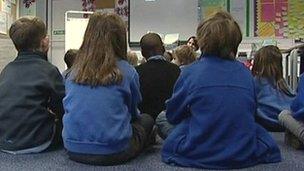Schools admissions appeals: More parents contest primary places
- Published

The government has released extra funds for new primary school places
More parents of young children in England have challenged decisions not to give them their school of choice.
The number of appeals lodged against primary school allocations has risen for the fifth year running, amid a shortage of school places.
Appeals against state primary school admissions rose by about 11% to just under 47,000 for 2010-11 - up from just over 42,000 the previous year.
Appeals against secondary admissions - excluding those to academies - fell.
Figures from the Department for Education , external show a fall in the number of appeals lodged against secondary school places, from just above 43,000 in 2009-10 to 36,565 last year.
Choice
But government statisticians say that fall might be partly due to the fact that academies were left out of the data. Many secondary schools have been switching to become academies, which are semi-independent and outside of local authority control.
If parents lodge an appeal, they can go before a panel and make the case for why their child should be admitted to a particular school.
If the school is found not to have followed its own policies for admitting pupils, it can be made to make space for a child.
There is a severe shortage of primary places in some parts of England - especially in London and the Midlands.
A Department for Education spokesman said: "Every parent should have the choice of a good local school for their child - our reforms will help create thousands of high-class new school places.
"We are driving up standards at the weakest schools by turning them into academies. Through the new admissions code, we are allowing the best schools to expand to meet demand.
"We are opening new Free Schools where parents want them - especially in deprived areas where there has been a history of poor education.
"And we are more than doubling targeted investment at areas facing the greatest pressure on numbers - over £4bn up to 2015 to create thousands of new school places."
'Crisis'
Although numbers of appeals rose at primary level, fewer parents won their appeals.
Nearly one in five was successful. Last year, the figure was closer to one in four.
The government has pledged an extra £4bn for new primary school places.
The shortage of places in primary schools reflects a growth in the birth rate - with some areas facing an increase of 25% or above in the primary school population.
It also means that in a few years secondary pupils will face a similar surge in demand.
Official forecasts earlier this year showed that an extra 450,000 primary places would be needed in England between 2010 and 2015.
Labour says there is a crisis over school places in England.
In a speech to the Labour party conference, the shadow education secretary Stephen Twigg said: "He [Education Secretary Michael Gove] thinks the way to build new schools is to throw darts at a map.
"So while there's a crisis in primary school places, Free Schools are built in areas with spare places."
- Published26 July 2012
- Published5 April 2012
- Published11 April 2012